
|
Nights of Cabiria (1957, It./Fr.)
(aka Le Notti Di Cabiria)
In co-writer/director Federico Fellini's romantic melodrama
- a post-war Italian
neo-realistic film with a wonderful musical score by Nino Rota -
the winner of the Best Foreign Language Film Oscar awarded in 1958.
[Note: Fellini's La Strada (1954, It.), also
starring Giulietta Masina (Fellini's wife), won the inaugural Best
Foreign Language Film Oscar awarded in 1956.]
The 1966 Broadway stage musical Sweet Charity directed
and choreographed by Bob Fosse (and Fosse's feature film directorial
debut and adaptation Sweet Charity (1969) with Shirley
MacLaine) both paid homage to Fellini's plot-line.
- the principal title character was Maria
'Cabiria' Ceccarelli (Giulietta Masina) - a waifish, short-statured,
optimistic-minded, naive, overly-trusting, independent street-walking
prostitute in the city of Rome, who sought clients in the Passeggiata
Archeologica of Rome's Parco di Porta Capena at night. The isolated
and disgraced outcast was often wearing a striped blouse, a ratty
fake fur jacket and ankle bobby socks. [Note: Her movements and
actions recalled Charlie Chaplin's comic Little Tramp character.]
- in the film's playful opening, Cabiria unexpectedly
became the victim of her live-in client-lover (and pimp) Giorgio
(Franco Fabrizi), who stole her purse with 40,000 lire and nearly
drowned her in a canal. It was the first of many similiar humiliations
and degradations that the heroine would experience in various episodes
or vignettes as she went on a personal odyssey to search for true love
- one night while outside a nightclub in the Via Veneto,
the starstruck Cabiria met jaded and recently-jilted movie star
Alberto Lazzari (Amedeo Nazzari), who after dancing the jitterbug-mambo
with her at a different club, invited her to his palatial house.
Upon the return of Lazzari's glamorous, irritated girlfriend to
the mansion later that evening, Cabiria (hidden away and locked
in the bathroom with the dog) watched as Alberto reconciled with
her after their earlier argument at the club
- that evening, she observed a nameless
"Man with the Sack" (Leo Catozzo) - a saintly 'good samaritan'
feeding and providing for vagrants and poverty-stricken cave dwellers,
including one of Cabiria's elderly and once-beautiful ex-colleagues -
it was a possible premonition of her own coming fate; afterwards, she
serviced a trucker
- a few days later during a religious pilgrimage and
church mass with other prostitutes and pimps at the Shrine of Divine
Love, she prayed to a statue of the Virgin Mary, vainly hoping
for a better and purer life ("Madonna, Madonna, help me to
change my life. Bestow your grace on me too. Make me change my
life"),
but nothing changed
- during a magic show in a variety-vaudeville theatre,
the drunk Cabiria was called upon by the mentalist-magician-wizard
(Aldo Silvani) (with devil’s horns) to be hypnotized on
stage; she became
the object of heckling and ridicule from the mostly-male audience
about her desired wish to be married to someone who truly loved
her; she imagined herself as a virginal maiden with a flowery crown
who was courted by an invisible caring suitor named Oscar in a
beautiful garden with lovely waltz music
- afterwards, an accountant named Oscar
D'Onofrio (François Périer) who witnessed the show,
was sympathetic to her plight. He met her out on the street, and
after getting to know each other better, Cabiria fell in love with
him when he proposed; she announced plans to marry him in two weeks,
while her streetwalker friend Wanda (Franca Marzi) cautioned her
about selling her shack-house and belongings, and withdrawing all
of her money (700,000 lire, her dowry) from her bank account
- Cabiria joined Oscar for a walk in
a wooded forest with high cliffs overlooking a lake, when she told
him: "You
suffer, you go through hell...but then happiness comes along for
everyone. You've been my angel"; but then she became suspicious
of Oscar's ruthless and dishonorable motives when his attitude changed
- after realizing his true intentions (she asked:
"You want to kill me?!"), she dropped her purse at his
feet, begged to die ("Kill me, kill me, throw me off the cliff!
I don't wanna live anymore"), and was left writhing on the
ground covered in dead leaves and dirt as he grabbed her purse,
ran off and abandoned her; it was a repeat of the film's opening
sequence
- after being devastated and humiliated once again,
as Cabiria returned to town in the film's redemptive coda, she
encountered teenaged revelers happily forming a circus-like parade
as they danced and played music. The ever-hopeful and undefeated
Cabiria - with her spirits lifted - joined the impromptu group
and gave a transcendent, hopeful and bittersweet teary smile -
the last image was of a single black tear falling from her left
eye
|
Final Transcendent Sequence - Cabiria
With a Single Black Tear
|

|
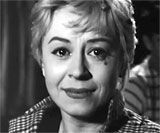
|
|
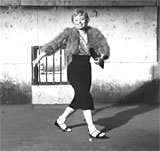
Rome Streetwalker Maria 'Cabiria' Ceccarelli (Giulietta
Masina)
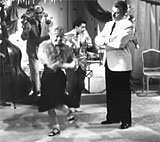
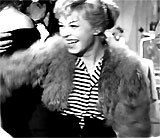
Cabiria's Jitterbug-Mambo Dancing with Movie Star Alberto
Lazzari
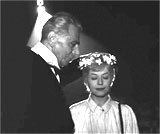
With Hypnotist-Mentalist

Cabiria Approached by Oscar D'Onofrio After Magic Show
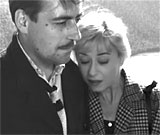
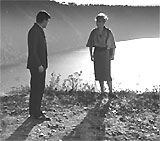
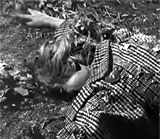
With Oscar at a Cliff-Edge Before She Was Robbed
|









